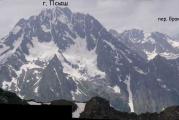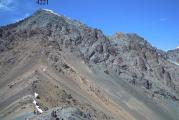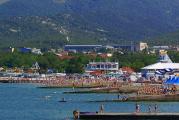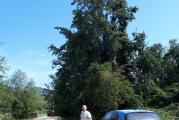Lost skills or who are real men. "Yenisei unites"
How to become a programmer. Today I want to pay attention to the opposite and return to our roots, the origins of our skills and the evolution of modern man.
Having chosen the profession of a programmer, I uncontrollably wanted to compensate for my efforts of sitting behind the code, to add variety to my life, to fill it with something close and pleasant. My second hobby is fishing, namely spinning. I have long dreamed of such days, trips to nature, to peace and quiet, where you could think about your perception, actions and plans. In 2013, I made more than 30 nature trips to small rivers and lakes in my area in search of a predator. This hobby is “from the heart”, apparently from our roots, and I like it.
But today, I want to write about a wonderful director whom I admired. There are very few mentions of him, his works and his films on Habré. Directed by Dmitry Vasyukov, series of documentaries "Happy People". The first films (4 series - spring, summer, autumn, winter) were filmed in 2005 on the river. The Yenisei is about people who live and survive in those parts, about nature, hunting and fishing, about the harsh taiga. In 2008, the film was seen by many, thanks to the Internet.
I found a group created by Dmitry Vasyukov in Facebook, dedicated to his series of films, and also recently opened a channel on youtube.
In the first four-episode film, the director reveals the life and life of people that we don’t even know about. So let everyone know about them:
Born in Bogotol on March 6, 1949. Then he left with his mother for Zelenogorsk near Kansk. In Zelenogorsk, he became addicted to hunting, often walked with a rifle through the surrounding forests, received good experience and laid the foundation for a future life. Then he went into the army.
The mentor after the army was Boris Petrovich Zavadsky - a great lover of the taiga, a connoisseur, and most importantly a person who understands the interests of hunters, and supported them with all his might - "everything will be fine for you, just hunt." Taught, helped, scolded. I still remember him as a mentor, a teacher. Lives in Shushenskoye. By the way, a great bear specialist.
Gennady married in 1979 to Zinaida. Raised three sons.

Born in 1960 in Primorye in the Lazovsky District, where his father worked in the Sikhote-Alin Reserve. After 2 years, the family moved to the Yenisei in Yartsevo. From there, in 1966, they moved to the village of Peno, Tver Region.
After school, Anatoly worked for six months at the timber industry in woodworking. Then he went into the army. After the army, another six months in woodworking. Then immediately to the Yenisei, this is in 1981. On the Yenisei to the base of the Institute. Severtsev "Peace". Got with the filing and approval of his father. This is how Tolin Yenisei began.
From 1984 to this day he has been working as a hunter. First, a full-time hunter in the state industrial farm, which was soon renamed the state farm. After the collapse of the state farm, he became a hunter-tenant. He continues to equip and complete his hunting area. It doesn't go to the mainland every year. The death of his father caught in the taiga. My mother specifically informed me later that I should not be torn to the nineties.
He married in 1989, and in 1993 Rita was born.
3. Grebenshchikov Sergei Vladimirovich (on the right in the photo)

Born in 1962 in Sverdlovsk region. Together with his family, he traveled around the country, lived in the Irkutsk region, then returned briefly to Astrakhan, to the homeland of his father (Rudolf Dmitritch Fomichev, stepfather, who was Sergei's father). There parents worked in the reserve. My father wanted to go to Siberia, he dreamed of working as a full-time hunter. Soon their father took them to Evenkia in the village. Osharovo on Pokamennaya Tunguska, hunters were needed there. Parents lived in Osharovo. Sergei in Baykit in a boarding school. For the summer he came to his father, he dragged him to the taiga to build huts, fish, taught him to the taiga. Finished 8 classes. (in 1974, brother Peter was born, also a hunter). After school, I went with my father completely for the season to the taiga. The family moved to the village referred to in the film in 1979. A year before the army, Sergei worked with his father on the equipment of the site - from scratch - a piece of wild taiga. They cut down the first two huts, golomukha and put up a tent. Before the army, he managed to go to Tomsk to study as a driver, there was still a dream to become a truck driver. From there he was called. He came in 1982, he was already engaged in the equipment of his site. Married in 1984. Three children were born.
4. Ilya Afanasevich Plotnikov - you can read about him



And many others. For partial acquaintance, please watch the films:
The films of Dmitry Vasyukov are real, they are about people who do not need our modern habits and gadgets, addictions and needs. They have one need - to survive, and they do it of their own free will.
After visiting the northernmost city of our route - Dudinka - we will go to Krasnoyarsk. On the way back, we will be able to stay longer in Kureika. This village is located 168 kilometers south of Igarka and is known for the fact that Joseph Stalin lived in exile here from 1914 to 1916. And our travelers will see the remains of the Stalinist pantheon, which was built for the leader of the peoples here, in the remote taiga, on the banks of the Kureika River in the early 50s. It was one of the largest buildings in honor of Stalin in the USSR. Inside was the hut in which he lived. A purpose-built power plant and boiler house provided the pavilion with warmth and light, while residential buildings There was no light. And around the Pantheon, blue fir trees brought from Moscow were planted. In the 60s the museum was closed, and later it burned down. After examining the ruins, we will move on - towards Goroshikha, Turukhansk and Vereshchagino. And project participants will be able to fully enjoy the road.
— Indescribable beauty sky. There will be white nights, this is practically a polar day, if there is, then a short period of time.
You will not forget these views for a long time, says Yury Tyazhelnikov, a participant in our project. He has already been on a cruise along the Yenisei twice, and now he wants to show the north of the region to his children. Recalling his trips, the philosophy teacher says that we usually look for something amazing far away in other countries, but in fact it is close to us.
YURY TYAZHELNIKOV, PARTICIPANT OF THE YENISEI UNITES PROJECT: "Our participants will have to face the real Yenisei. The warm Yenisei. We have lost the habit of it, we grew up in a situation where the Yenisei is ice-free, and literally 200-300 kilometers - and another begins The Yenisei is a living river, and there, of course, the natural component is very large. Beautiful places, original, authentic, rich in all the gifts of nature, fish, cone".
On the ninth day of the journey, we will stop at Bakhta. This taiga village became famous all over the world after the release documentary film"Happy people". Just like that, happy, they saw local residents filmmakers from Moscow. To show the beauty of the life of Siberians, they spent a whole year in Bakhta. The heroes of that film, hunters and fishermen, still live here. They say that after the release of the film, many tourists appeared in Bakhta, and they even began to be recognized.
ANATOLY BLUME, HERO OF THE FILM "HAPPY PEOPLE", HUNTER-HUNTER: "So it was that they recognized, but I never burned with the desire to be a movie star. So I treat it like this, at arm's length. In the summer, of course, people begin here, the riding is intense, of course, not very good, I came here in due time for another."
The inhabitants of Bakhta rely only on themselves. Almost all are hunters and fishermen. The writer Mikhail Tarkovsky, the grandson of the poet Arseniy Tarkovsky and the nephew of director Andrei Tarkovsky, is also engaged in fishing. Since childhood, he dreamed of the Yenisei and the taiga. And he has been living in Bakhta for 30 years. Project participants may be able to communicate with the writer.
MIKHAIL TARKOVSKY, WRITER: "The first years on the Yenisei, when it was wilder, and most importantly, we were young and could perceive absolutely everything that we saw around. Spring came - this spring is in you. We completely dissolved, the soul was open. And "Probably, this image of the Yenisei will never disappear, it will never be erased. Now it changes every time. But every time you discover something new, something of your own."
In Bakhta we will visit the Church of the New Martyrs and Confessors of the Russian Church. In the last two days, the participants of the trip are waiting for beautiful road home. At this time, tourists will be able to enjoy the silence on board. On the 10th day, the ship will make short stops in Vorogovo and Yartsevo. And then it will go towards Yeniseisk. The journey will end around midnight on July 14th. Viewers will be able to watch a full-fledged film about the northern cruise of the inhabitants of the region a little later on the air of the Yenisei TV channel. And you can find out more about our route on the site yeniseyobedineyaet.rf.
Series of essays: LIFE and DEATH MANSI
« Some people hear their inner voice very clearly and live as it tells them to. Such people go crazy. Or become legends».
Thus begins the story of the Ludlow family - a fast-paced and romantic tale of three brothers, their father, and a young and irresistible woman who fatally changes the lives of each of them. This is the movie "Legends of Autumn".This is how my story of the Mansi Sambindalov family from Lake Turvat begins. About four brothers, two sisters, their father, mother, and irresistible young women they don't have. A free sequel to Western history.
Chapter 1
Continuity and tradition. I think the last generation. The Sambindalovs are going to leave the land of their ancestors - the shores of Lake Turvat (Yalpyng-Tur, mans. " holy lake"). When the last Sambindalov leaves it, an era will die.
1
Holy place- this is when there are people who consider it as such. They spiritualize, sacralize the space. The Sambindalovs are the keepers and bearers of such knowledge. From grandfather to father, from father to son, privileges and duties associated with sacred knowledge were passed down for centuries.
2
V.P. Sambindalov with his son at the sanctuary of Lake Turvat. 1990 Author A.V. baulo
The appearance of Lake Yalpyng-Turot refers to the earliest events in the mythological history of the Mansi and is associated with the legend of the origin of the earth. Guardian Spirit local mountains Nyor-Oyka (Mountain Old Man) and Chokhryn-Oyka (Old Man-Knife) chose as their haven the sources of the great Northern Sosva, hugging from two sides holy lake. They were also chosen for residence by the Sambindalov clan - the clan of the keepers of these gods. Mansi of other families could contact Ner-Oika and Chokhryn-Oika only through them. Everything is gone. The upper Sosva was empty. The gods leave with the Mansi. Savva's family is the last.
3
On the way from Nyaksimvol to Turvat. Left to right: ml. sons Andrey and Alexey, Savva, Tatyana, Dima (grandson) Sambindalovs
But they are also building a house in Nyaksimvol. Such is the spirit of the times. We ordered the construction of a settlement merchant, he brought with mainland swarthy builders who raised the house. Foam block, with wall heating. Tajiks for Mansi. You don't need to fire up the oven. This has been pointed out to me several times.
4
official winter road Nyaksimvol - Ust-Manya
Chapter 2
We met at Sia's house, on Taiga 14, in Nyaksimvol.
5
Oleg and Andrey - big-cheeked fellows, poured out by the natives of the Urals according to anthropomorphic signs, visited Sia in the hut to eat every day. Yes, not once - I was really surprised. Siya's wife has been cooking for a long time not for three, but for all the Sambindalovs, who will look into the light.
Are they not being fed at home? I asked Marvanna.
Apparently, - she answered me and explained that the Turvat Sambindalovs huddle with their future neighbors, next to their construction site. They don't get much food there.
Marvanna is a Mansi, and Siya (Sergey) is her husband, also a Mansi, and both of them are Sambindalovs. They differ from the Turvatian in their way of life. They grew up in this village and to a large extent became Russified, not by blood, but by way of life. In the yard, nothing will betray Mansi in them. A typical village courtyard, where ethnic features are leveled.
6
Nevertheless, both Siya and Marvanna speak Mansi fluently, but their daughter is not very good, because they communicate in Russian at home. Even teaching the Mansi language at school does not help. The Turvat Sambindalovs, on the contrary, hardly communicate in Russian. So when they are visiting, I sit and catch mean words, trying to catch the meaning.
Reticence is a distinctive feature of the Turvatian Sambindalovs. This is family. Only Savva and Tanya sometimes whisper, so quietly, like sparrows, it’s even interesting that they haven’t managed to tell each other for so many years.
7
The sons are silent, notorious. They can separately go hunting for several days without saying anything.
8
Oleg loading shells
None: “Mom, I, this one, went to Yalbynya, I’ll hunt.” It is not known: where, how much, why - although, I suspect, only I do not know. According to the collection, the mother will understand everything, and if necessary, she will collect food. Without words. It struck me. No one comes out on the porch to see them off, does not wave a handkerchief, neither bye nor hello. Like a bakery around the corner. But there is taiga. There are many force majeure circumstances, and leaving for half a day, you can leave forever.
9
sable skinning knife
Chapter 3
Savva has 4 sons, 2 daughters, 2 grandchildren, 2 cows, 8 dogs, 3 cats.
10
The Sambindalovs live in a hut the size of a two-room apartment.
11
The crowding in the house is compensated by hunting huts scattered around the neighborhood, where everyone is his own master.
Here it seems interesting to me to draw some parallels with the film "Legends of Autumn" about an American family in the American "taiga". In the film, three brothers scattered around the wide world because of the education they received, or rather, enlightenment and anxiety for the fate of the world - in a word, they made "woe from the mind." One of them was too carried away by politics in Europe, and decided to lay down his head on the fields of the First World War. He succeeded, despite the guardianship of the second brother, a born hunter Tristan (Brad Pitt).
The Sambindalovs do not receive any press, they do not read anything at all, they do not watch the news, although recently they have had satellite television. The corrupting influence on them is exerted exclusively by TV series on NTV, judging by which the urban world is divided into operas and bandits. But when an Udege appeared on the "Field of Miracles", everyone gathered to watch.
12
The farthest light where Oleg (older brother) was was Yekaterinburg. He didn't like it there: it stinks. Savva (father) has never been further than Ivdel (the nearest town 200 km away) in his entire life. Problems big Russia they don't care, and political life Western Europe especially.
13
In the Nyaksimvol store
The American Ludlow brothers mastered the college, the Turvat brothers skidded through the 5th grade in Nyaksymvol. And thank God. I made a small observation here that the best hunters among the Mansi are those who studied the least at school. Here is their neighbor in the taiga, Vova Tasmanov, he did not study at school, but he is a good hunter and does not miss at all. For those Mansi who complete the full course of a boarding school (grades 9 or 11), something irreversibly changes (breaks) in the brain, and they drop out of the "forest" life. But as a rule, they do not become city dwellers either. So they talk about this and that.
14
Andrew repairs the sled
Savva's sons are only at first glance similar. With each of them individually, I traveled, talked (was silent) tete-a-tete. The older brothers are eager for the forest, I'm afraid last mohicans"It's about them. Younger others - fishing does not attract them, rather life obliges. Therefore, the ratio in prey is 10 to 1 in favor of the elders - the beast runs to the catcher. The younger Andrey and Aleksey (24 and 23 years old) like to be at home more - I predict them to settle in Nyaksimvol, but the older ones do not want to go there, Oleg and Ilya are unlikely to take root in the village. The land is here, without them nothing. At 26 and 25 years old, they have already killed twice as many moose as they are years old.
15
Pull the family budget. 4 carcasses is 100 thousand rubles. With a favorable set of circumstances, one good hunter can do this in one day, or 4 hunters may not do it all winter. So once Oleg was lucky, but, I repeat, here the circumstances (weather and snow conditions) are no less important than the experience and luck of the hunter. Sia, who can be guided as a standard, once in the local area over the winter alone caught 21 elk. He worked at a fur farm near the lake, then foxes and silver foxes were fattened with elk meat.
16
An anecdotal case. I went to an elk, I went to a bear, and the cat tore Sia's hand at a party.
Epic movies don't show that. People on the screen are killed in batches, but you can’t touch the little animals, it’s not ethical. Let's be honest - almost all of us eat meat, and sometimes you have to face the truth (killed animals) in the eye. I looked - yes, it's a pity, but nothing, dragged, loaded, ate later. Also how to eat. So let wild animals be killed by those who have been doing this since childhood, professionally, for whom this is not an ethical problem.
17
For the Sambindalovs, hunting is a means of subsistence. In the woods as a job. And God forbid to plow at work like Ilya and Oleg plow. This is not driven hunting, where there are 20 hunters with optics for one moose. This is an individual hunt "stealth". The moose must be tracked down, trailed, approached 50 steps and hit with a gun - there is no carbine. And the forest is often too dense for rifled distances. The elk is a sensitive animal, it will not let the inexperienced. The amateur will not let himself in, entangled in the tracks. The dog will help only until the New Year, then there will be more snow. A successful moose hunt does not mean that the meat is yours. It is necessary to have time to butcher and take out before the arrival of other meat lovers. Wolverines, first of all. You can see it at Shpilenok. This impudent creature can drag the whole carcass to its bins overnight, if it finds it. Half a day or the whole day will be spent on clearing a clearing for a snowstorm to a well-trodden path, the same amount for a warm-up by a snowmobile, and only then removal on a sleigh.
18
Selling meat is not a problem, the buyers themselves hover around. They strive, however, to get drunk and buy cheap. This scheme is still very popular in relation to the Mansi, but does not work on Turvat. Tanya is on guard of the family budget. Hunting inspection too. According to rumors, she can’t get to Turvat because of the impassability, but the Mansi of the upper Sosva are still worried that they can be punished. And not only Mansi. The entire local population hunts in violation of the terms of hunting and fishing methods. They don't give a damn about licenses and tickets. There is a trunk in every house, and at best one out of five is registered. To register a gun, you need to buy it legally, and for this you need to have a license to purchase, which is issued by the Department of Internal Affairs for a fee and is valid for 6 months. Still need a safe for storage. And some more "pitfalls". In short, the prohibitive bureaucracy for the Mansi. On some crossings to the regional center you will go broke. The shadow turnover is flourishing - it is unprofitable for either the seller or the buyer to contact the state.
19
However, many fears are born from ignorance. federal hunting law dated July 24, 2009 (Article 19) reads: “ Hunting in order to ensure the maintenance of a traditional way of life and the implementation of traditional economic activity carried out freely (without any permits) in the amount of hunting resources required to satisfy personal consumption". And further: " Hunting products obtained in the course of hunting in order to ensure the maintenance of a traditional way of life and the implementation of traditional economic activities are used for personal consumption or sold to organizations engaged in the purchase of hunting products". But they can cling to an unregistered gun. It turns out that it is safer for Mansi to hunt the old fashioned way.
Hunting by traditional means (crush traps, nooses) is now legalized ( Federal Law "On the Animal World", article 48): "Citizens of the Russian Federation, whose existence and income are wholly or partly based on the traditional life-support systems of their ancestors, including hunting and gathering, have the right to use traditional methods of harvesting objects of the animal world and their vital products, if such methods do not directly or indirectly lead to a decrease in biological diversity, do not reduce the number and sustainable reproduction of wildlife, do not disturb their habitat and do not pose a danger to humans».
20
And from July 1, 2011, a new form of hunting tickets is being introduced in Russia, where they seem to promise a special mark on free hunting for the indigenous peoples. Mansi is not aware of all these nuances. When meeting with the inspector, they are obviously in a losing situation, since they are helpless in verbal battles. Inspectors can leave without prey and without a gun. However, as agreed.




